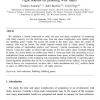Free Online Productivity Tools
i2Speak
i2Symbol
i2OCR
iTex2Img
iWeb2Print
iWeb2Shot
i2Type
iPdf2Split
iPdf2Merge
i2Bopomofo
i2Arabic
i2Style
i2Image
i2PDF
iLatex2Rtf
Sci2ools
ICALP
1994
Springer
1994
Springer
On the Cost of Recomputing: Tight Bounds on Pebbling with Faults
We introduce a formal framework to study the time and space complexity of computing with faulty memory. For the fault-free case, time and space complexities were studied using the "pebbling game" model. We extend this model to the faulty case, where the content of memory cells may be erased. The model captures notions such as "check points" (keeping multiple copies of intermediate results), and "recovery" (partial recomputing in the case of failure). Using this model, we derive tight bounds on the time and/or space overhead in icted by faults. As a lower bound, we exhibit cases where f worst-case faults may necessitate an (f) multiplicative factor overhead in computation resources (time, space, or their product). The lower bound holds regardless of the computing and recomputing strategy employed. A matching upperbound algorithm establishes that an O(f) multiplicative overhead always su ces. For the special class of binary tree computations, we show that f...
ICALP 1994 | Lower Bound | Multiplicative Factor Overhead | Programming Languages | Time And/or Space |
| Added | 09 Aug 2010 |
| Updated | 09 Aug 2010 |
| Type | Conference |
| Year | 1994 |
| Where | ICALP |
| Authors | Yonatan Aumann, Judit Bar-Ilan, Uriel Feige |
Comments (0)

